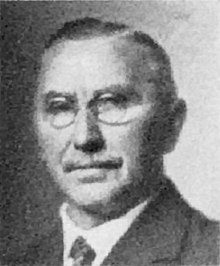Hermann Fleissner
Hermann Fleissner (born June 16, 1865 in Dresden , † April 20, 1939 in Berlin ) was a social democratic politician.
Pre-war period
After elementary school, Fleißner trained as a carpenter . He worked as a journeyman until 1895 and then for a short time as a self-employed master carpenter in Pirna .
As early as 1884 Fleißner joined the SPD and in 1895 he also became a member of the woodworkers' association. From 1885 to 1898 he was chairman of the local SPD in Pirna. Professionally, Fleißner was from 1897 with interruptions until 1917 initially a reporter for social democratic newspapers and later editor of the Dresdner Volkszeitung . Fleißner was a member of the central party committee of the SPD from 1913 to 1917 and chairman of the Dresden party organization. He was a member of the left wing of the party even before the war.
Between 1900 and 1903 Fleißner was a council member in Löbtau and from 1905 to 1909 a city councilor in Dresden. From 1909 to 1920 he was a member of the Saxon State Parliament and the Saxon People's Chamber . Before the First World War he was unable to enter the Reichstag despite a candidacy in 1907 .
First World War and Weimar Republic
When the USPD was founded in 1917, Fleißner switched to this party and was its party chairman in Dresden until 1921. He also sat on the party's central advisory board for a while and worked as an editor of the party press ( Independent People's Newspaper ). In 1920 Fleißner belonged to the minority of those who rejected the party's accession to the Communist International at the extraordinary party congress in Halle . He therefore did not participate in the union with the KPD, but came back to the SPD in 1922 with the Rump USPD.
During the November Revolution, Fleißner was a member of the Council of People's Representatives for Saxony. On November 10, 1918, Fleißner proclaimed the Republic of Saxony ("Free State of Saxony") in the Sarrasani Circus and became Minister for Military Affairs in the Lipinski cabinet . He held this office until January 16, 1919. Between 1920 and 1924 he was State Minister for Popular Education. In 1927, Fleißner ran in vain as an opposing candidate in the Saxon state parliament against Max Heldt from the split off Old Social Democratic Party for the office of Saxon Prime Minister. In the internal party debate about the construction of the armored ship A , Fleißner stood in opposition to the leadership of the party and voted with other members of the left wing at the party congress in 1929 against a draft on defense policy. Two years later he was also a member of the inner-party opposition, which is probably one of the reasons why his candidacy for the party executive committee failed. In 1930 Fleißner failed at the state party congress with his attempt to become a candidate of the SPD for the position of Prime Minister of Saxony. The fact that he joined the Marxist Tribune in 1931 speaks for his leftist position.
Fleißner had been a member of the Reichstag since 1924 and was a member of parliament until 1933. He also worked as a freelance writer and author.
During the Nazi era , Fleißner was imprisoned for several months.
literature
- Social Democratic Party of Germany (ed.): Committed to freedom. Memorial book of the German social democracy in the 20th century . Marburg, 2000. p. 96
- Franz Osterroth / Dieter Schuster: Chronicle of the German Social Democracy. Vol. 2: From the beginning of the Weimar Republic to the end of the Second World War . Bonn, Berlin, 1975.
- Martin Schumacher (Hrsg.): MdR The Reichstag members of the Weimar Republic in the time of National Socialism. Political persecution, emigration and expatriation, 1933–1945. A biographical documentation . 3rd, considerably expanded and revised edition. Droste, Düsseldorf 1994, ISBN 3-7700-5183-1 .
- Carsten Schmidt: Between truce and class struggle. Social Policy and War Society in Dresden 1914–1918 Dissertation Dresden 2007 ( PDF file; 1.52 MB )
Web links
- Literature by and about Hermann Fleißner in the catalog of the German National Library
- Literature by and about Hermann Fleißner in the Saxon Bibliography
- Hermann Fleißner in the database of members of the Reichstag
- Andreas Reichel: Hermann Fleißner (1865–1939) . In: Institute for Saxon History and Folklore (Ed.): Saxon Biography .
- History of the SPD in Pirna (PDF file; 328 kB)
Individual evidence
- ^ Chronicle of the German Social Democracy, Vol. 2, p. 75
- ↑ Chronicle of the German Social Democracy, Vol. 2, p. 178
- ↑ Chronik der Deutschen Sozialdemokratie Vol. 2, p. 204, p. 232
- ^ Chronicle of the German Social Democracy, Vol. 2, p. 214
- ^ Chronicle of the German Social Democracy, Vol. 2, p. 249
| personal data | |
|---|---|
| SURNAME | Fleissner, Hermann |
| BRIEF DESCRIPTION | German politician (SPD), MdL, MdR |
| DATE OF BIRTH | June 16, 1865 |
| PLACE OF BIRTH | Dresden |
| DATE OF DEATH | April 20, 1939 |
| Place of death | Berlin |

